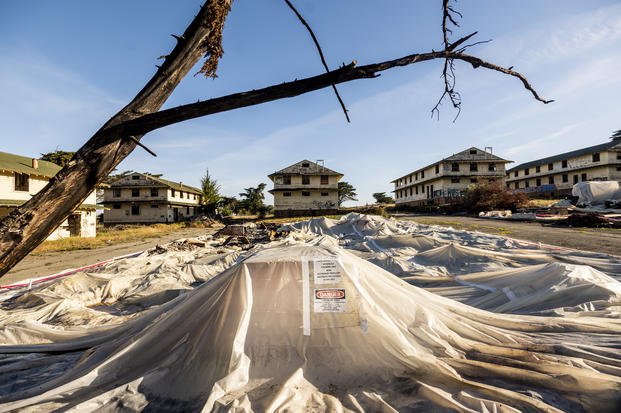The passage of the PACT Act gave millions of veterans the chance at expedited disability compensation from the Department of Veterans Affairs, but thousands of others exposed to environmental hazards in military service wait roughly 31 years to receive similar recognition from the VA, a new report has found.
In a report released Wednesday by Disabled American Veterans and the Military Officers Association of America, the groups said the VA's disability claims filing process -- in which veterans must prove that their health conditions are directly related to military service -- is cumbersome for those who are unaware that they were exposed to toxic substances or those who don't connect a latent illness with their military service.
In "Ending the Wait for Toxic-Exposed Veterans," retired Army Lt. Col. Gary Sauer said he knew he had musculoskeletal injuries from jumping out of military aircraft but initially did not connect two illnesses -- non-Hodgkin lymphoma and a rare kidney disease -- with military service.
Read Next: US Warplanes, Ships and Troops Ready in the Middle East if the Conflict Expands
He now believes they were caused by exposure to per- and polyfluoroalkyl substances, or PFAS, at Ford Ord, California, where he served early in his career. In 2017, Fort Ord was found to have more than 80 times the maximum amount of several PFAS chemicals set for drinking water by the Environmental Protection Agency this year.
"We're using that [water] to prepare food. We were drinking it straight from the water fountains. ... We were showering in it, brushing our teeth," Sauer said in the report. "So, the exposure of that was pretty significant."
Sauer is waiting on a claims decision, having filed tests that show he has PFAS chemicals in his blood decades after exposure.
The report found that the VA takes an average of 31 years to recognize an exposure for an individual veteran after it first occurs, and establishes a presumptive service connection -- a designation by the federal government that eliminates the requirement to prove a military tie -- for exposure-related conditions after about 34 years.
This is too long to help many veterans, the report authors noted.
"Despite major toxic-exposure laws enacted every decade or two over the past century, the
time veterans have to wait from the moment of exposure to meaningful VA compensation and medical support remains shamefully long -- more than three decades on average, according to our research," the report stated.
In response, VA officials acknowledged that veterans have waited "far too long" to receive benefits, but the PACT Act, which extended benefits to several populations of ill veterans, including those exposed to burn pits and other airborne hazards during the Global War on Terrorism, has allowed the VA to expedite claims for millions of veterans and their survivors.
"We're currently delivering more care and more benefits to more veterans than ever before, but make no mistake -- we will not rest until every veteran gets the care and benefits they deserve. We are grateful for the feedback from our partners, and we will continue to work with them to fulfill our shared mission," VA Press Secretary Terrence Hayes said in a statement Thursday.
According to the VA, the expedited presumptive conditions for 23 diseases listed in the PACT Act, along with hundreds of other associated illnesses, will benefit roughly 900,000 veterans or their survivors.
The PACT Act also codified a process through which the VA can establish new presumptive conditions and, according to the department, it is using that process to determine whether to make three conditions -- acute leukemias, chronic leukemias, and multiple myeloma outside of the head and neck -- presumptive for those who served in Iraq, Afghanistan, Somalia, Djibouti, Egypt, Jordan, Lebanon, Syria, Yemen, Uzbekistan and the entire Southwest Asia theater of operations.
Former Army Staff Sgt. Mark Jackson served at Karshi-Khanabad Air Base in Uzbekistan from 2003 to 2004 and has spent 10 years fighting for VA disability benefits. While he is compensated for the loss of his thyroid at age 27, he also suffers from anemia and osteoporosis -- conditions he attributes to toxic exposures at the former Soviet military installation.
"The basic terms of service when you sign up is that you are going to give all the way up to and including your life, and they are going to take care of you and your family. But they are not honoring their end of the bargain," Jackson said in a video accompanying release of the report.
The report makes several recommendations to Congress and the VA to improve the claims process for veterans, to include enacting legislation that would create a new framework for establishing exposure presumptive conditions, expanding research, and instituting policies that would require the VA and Defense Department to work with Congress to allow service members to enroll in VA health care before transitioning from the military.
The report also recommended that the DoD and VA expedite creation of a joint electronic health records system, and the VA should create a new classification system for toxic exposure and related presumptive conditions where there is limited scientific evidence showing a causal relationship.
"The PACT Act was a monumental step in the right direction, but the work is not done," retired Air Force Lt. Gen. Brian Kelly, MOAA president and CEO, said in a statement Wednesday.
"We are proud to work with MOAA to propose a paradigm shift that finishes what the PACT Act started by comprehensively reforming the way the VA responds to toxic wounds," added DAV Washington Headquarters Executive Director Randy Reese.











